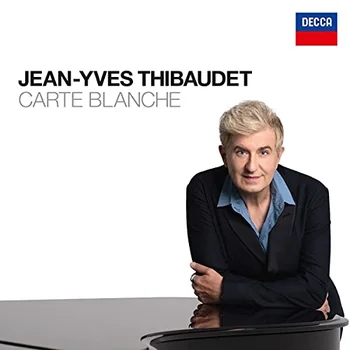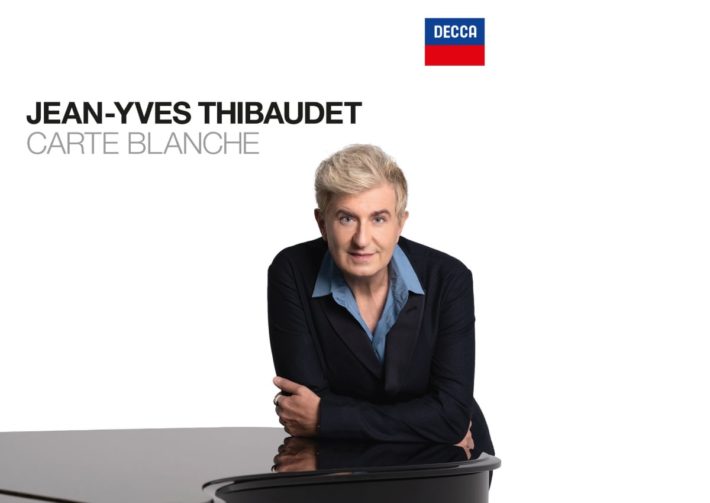Jean-Yves Thibaudet’s newest release, celebrating his 50th birthday, may be his most eclectic yet. The curation is in some ways a reflection of his vast repertoire in microcosm – one which ranges from Liszt and Ravel to Messaien and even to the realms of jazz and film. While the works themselves are relatively short, each is a snippet that ties into a special moment of his life. In this way, Carte Blanche becomes his own musical biography.

Among the classical set, Couperin‘s Le Tic Toc (track 6) is quite nice. The work was originally intended for a double-manual harpsichord; an adaptation for the modern instrument can pose challenges in the form of tricky hand crossings. Not so for Thibaudet, whose articulation is neat but not mechanical. The interpretation has a refreshing and plucky energy; some lovely color shifts also account for the timbres one might hear on each manual of the harpsichord.
Granados’ Quejas o la maja y el ruiseñor (track 14) is an homage to Alicia de Larrocha, whom Thibaudet met on several occasions. There are plenty of rich sonorities in his performance, but I do still prefer de Larrocha’s 1977 Decca recording, which has more nuances and heightened distinctions between work’s wistfulness and passion.
The element of youth emerges in Heitor Villa Lobos’ O Polichinelo (track 15). Part of A próle do bébé (The Baby’s Family) suite, it’s a popular choice of study among aspiring young piano students. Thibaudet turns it into much more than that: the impeccable clarity of the interlocking chords hums with excitement, and the melodic line that peeks out has an inviting sense of mischief. The tempestuous jabs that appear in the low bass add to that, catching us by surprise on several occasions.
Several tracks are arranged for solo piano by the pianist himself. A nice example is Poulenc‘s Hôtel from the Banalités: weaving in a vocal line with piano accompaniment runs the risk of the melody getting potentially lost, especially in as harmonically expansive a texture like this one. However, that’s not much of an issue with the pianist’s skillful voice leading. The relaxed tempo also gives the song a languid air, one in which we can savor Poulenc’s lush compositional language.
Morton Gould’s Boogie Woogie Etude (track 18) is one of the real showpieces on the album. Thibaudet describes the immediate interest he had in the work after hearing his friend Shura Cherkassky perform it as an encore. It’s undoubtedly catchy–eccentrically jazzy, this particular performance has an unapologetic boldness with thunderous basslines and a satisfyingly boisterous conclusion. That’s not to say that Thibaudet completely throws pianism out the window, though: a pronounced rhythmic drive and agile contrasts in dynamics keep things exciting but not out of control.
Just like its counterpart, the non-classical fare provides some nice variety. Jesse Kissel’s arrangement of the perennial Disney favorite, When You Wish Upon a Star (track 21), is again adapted by Thibaudet for solo piano. There are unexpected dramatic moments like the furious opening, but the performance ultimately captures the song’s dreaminess without coming off as overly-saccharine. “I’ll be Around” (track 23) is another highlight: the piano rendition might be a little more crystalline than the very first recording sung by Cab Calloway back in 1942, but Thibaudet’s translucent tone still evokes a tender reminiscence.
The piano used on the recording has a rather brassy tinge, but the sound engineering manages to temper it, which in turn helps highlight the pianist’s delicate sensibilities. The liner notes are in the format of an interview, conducted by none other than Thibabudet’s longtime friend and collaborator, Renée Fleming. It’s a nice change from the standard analysis and sheds light on a personal significance behind the works and the album as a whole – a celebration, he describes, of a special birthday.
For such a wide range of music, Thibaudet does an excellent job of making his pianistic voice heard in each work. This album is certainly as much a delightful adventure for the listener as it clearly is for the performer. It will undoubtedly appeal to a broad range of musical tastes – warmly recommended.
Recommended Comparisons
Thibaudet | Cherkassky | Thibaudet | de Larrocha
“Carte Blanche”
Jean-Yves Thibaudet – Piano
Decca Classics, CD 485208



















